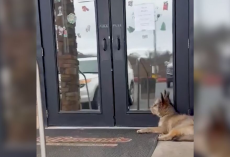Have you ever thought about how dogs can also experience anxiety and depression? It’s true that it may not be the same level as what humans experience, but it definitely happens. We rarely ever talk about dog mental health and there isn’t a lot of information about it online. That’s why we’re here to talk about it.
Dogs are a lot more similar to us than we think. They may not be able to comprehend and think the way we do, but they feel. Pet owners usually think that they should only look out for their dog’s physical well-being, but the mental state of our pets can also affect their overall well-being — it plays a huge part in how they live their lives.

There are a number of possibilities as to why your dog could be behaving a certain way, more often than not, it can be attributed to mental health or high stress. When presented with sudden changes in the environment or if they experienced a traumatic incident, it will most likely have a huge impact on them.
As a responsible dog owner, it helps when you can at least help your dog throughout that period in their life. Being there for them and being able to tell when they’re not their best is a start for you to be able to help them ease it in any kind of way. After all, they are there for us whenever we don’t feel like our best.
We have to understand that there aren’t sure-fire solutions to this, it’s a trial and error, but here are a few tips on how to learn to spot signs of stress, as well as reasons for possible mental health problems in dogs :
Observe their body language and how they are responding to you

There are multiple factors as to why they could be behaving a different way, try to track down any kind of change and pinpoint what is causing the uneasiness.
If your dog is showing any signs of whale eye (revealing the whites of their eyes), tucked ears and/ or tail, constant licking and yawning, and panting — it could be that your dog might be showing signs that there is something wrong.
Other signs are alarmingly decreased appetite, isolation (constantly distancing from humans or other pets), hiding, trembling, destructive behavior, and aggression towards strangers.
Depression in dogs is usually temporary and often comes in response to a major life change, such as moving to a new home. It will often resolve itself as the dog acclimates to their situation.
Compulsive behaviors can start out as a way for dogs to soothe themselves. They become problematic when dogs ritualize the behavior.
When they’re showing any of those mentioned above, try to not pressure them into socializing or into “stopping” what they’re doing. Make sure to reassure them and take the time to comfort them.
Lack of exercise and mental enrichment

When dogs don’t get to release their pent-up energy and are not living active lifestyles it could lead to anxiety and destructive behaviors such as destroying items and aggression. Usually, when dogs are just kept at home, they tend to become either extremely territorial or afraid of others. Not allowing them to go out will prevent them from being comfortable around foreign stimuli and they will not fully know how to respond to it.
Making sure that they get proper exercise like daily walks or being able to freely run around in an open space will boost them up. Another way is letting them play with toy puzzles that will help give them mental stimulation.
Absence of a safe zone and not giving them their personal space

As we mentioned, dogs are very much like human beings. They don’t want to be with you all the time and there will be moments where they just want to chill in their own corner or be alone.
Giving your dog their own safe space will allow them to feel more secure, as well as providing them with a “safety blanket” in the form of a toy or a bed they can retreat to during times of distress. Some dogs even prefer to be under the furniture. Don’t worry if you can’t see them all the time, as long as they’re safe, it’s fine. This is important to remember when you are moving or have moved to a new home, dogs take time to adjust especially if it’s a sudden change in environment or routine.
Another thing to note is that too much attention could lead to more anxiety and can cause them to be too attached which could also lead to separation anxiety. It also won’t be good for you either.

Aside from what we have mentioned above, it also helps if you have a regular vet visit schedule. It will give you a chance to be up to date with how your dog is in terms of their health. It’s always best to have a professional to consult regarding health concerns for your dog. A chat with an expert will aid in pinpointing the reasons for your concern and will help solve them. You will have peace of mind that your dog’s concerns are being addressed and taken care of.
If you suspect your pet is sick, beyond home remedy, call your vet immediately. For health-related questions, always consult your veterinarian, as they have examined your pet, know the pet’s health history, and can make the best recommendations for your pet.
Patience is key to helping your dog get better. Dogs, unlike humans, are unable to fully communicate their needs, but it is your responsibility as their partner to be able to get them through these tough moments in their lives.
Don’t get mad at them when they aren’t as responsive or when they’re behaving in a certain way that isn’t usual for them. It can get on your nerves sometimes and it’ll really be somewhat of an inconvenience even, but keeping positive and educated on these matters will help you know how to keep your dog healthy, mentally and physically!











